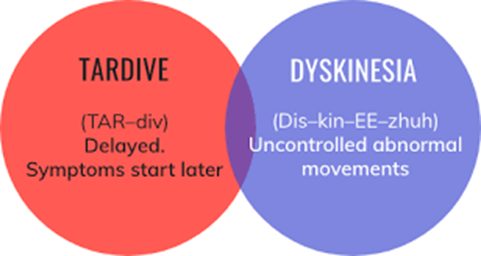A client has been taking an antipsychotic medication for several years. It is of vital importance for the nurse to observe the client for tardive dyskinesia. Signs and symptoms of tardive dyskinesia include:
Absence of physical and mental movement
Loss of ability to perform voluntary movements
Repetitious, involuntary muscle movements in the face and extremities
Rigidity in the muscles that control an individual's gait, posture, and eye movements
The Correct Answer is C
Choice A rationale: absence of physical and mental movement refers to catatonia that can occur in severe depression or schizophrenia.
Choice B rationale: akinesia refers to the absence of voluntary movement and can be seen in individuals with Parkinson’s disease or as a side effect of some antipsychotic medications.
Choice C rationale: these are signs and symptoms of tardive dyskinesia which is a serious side effect of antipsychotic therapy resulting from the damage of nerve cells controlling movement and is irreversible especially when detected late.
Choice D rationale: this refers to dystonia which is a condition characterized by abnormal muscle tone resulting in painful muscle spasms and abnormal postures. This is a side effect of some antipsychotic medications.

Nursing Test Bank
Naxlex Comprehensive Predictor Exams
Related Questions
Correct Answer is ["0.4"]
Explanation
To answer the above question we will use the formula:
Dose (ml)= ordered dose (mg)/ Concentration (mg/ml)
= 2mg/5mg/ml
= 0.4 ml
Correct Answer is C
Explanation
Choice A rationale: fats are directly related to lithium therapy and does not require any special monitoring during the drug’s intake.
Choice B rationale: proteins do not affect the blood levels of lithium hence they do not require any special monitoring during the drug’s intake.
Choice C rationale: Lithium is a salt that can affect the fluid and electrolyte balance in the body and competes with sodium for their reabsorption in the kidneys.
Therefore, if the client consumes too much or too little sodium, it can alter the level of lithium in the blood and cause toxicity or ineffectiveness hence the need for close monitoring.
Choice D rationale: potassium does not affect the blood levels of lithium hence no special monitoring during intake is required.
Whether you are a student looking to ace your exams or a practicing nurse seeking to enhance your expertise , our nursing education contents will empower you with the confidence and competence to make a difference in the lives of patients and become a respected leader in the healthcare field.
Visit Naxlex, invest in your future and unlock endless possibilities with our unparalleled nursing education contents today
Report Wrong Answer on the Current Question
Do you disagree with the answer? If yes, what is your expected answer? Explain.
Kindly be descriptive with the issue you are facing.
